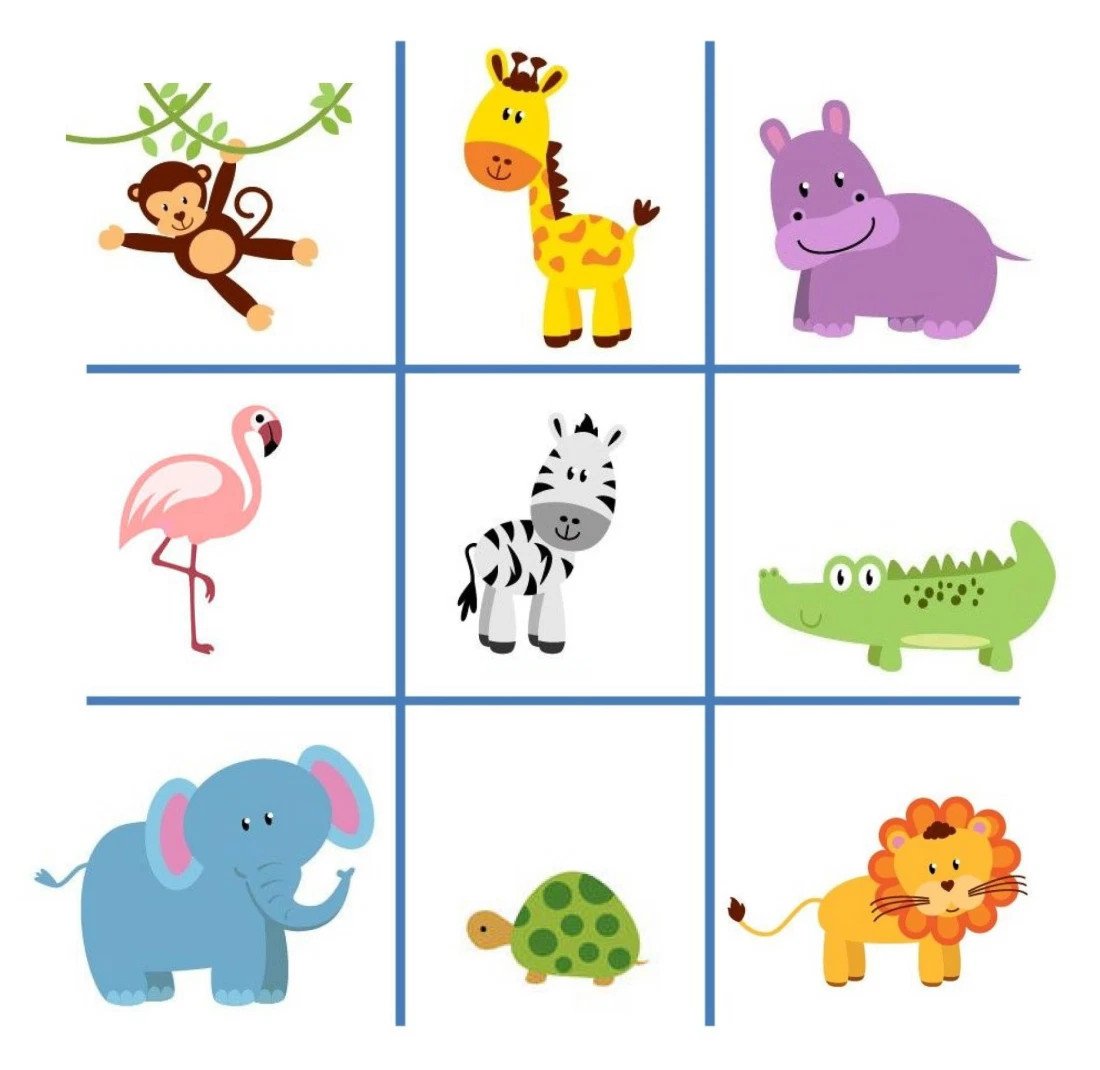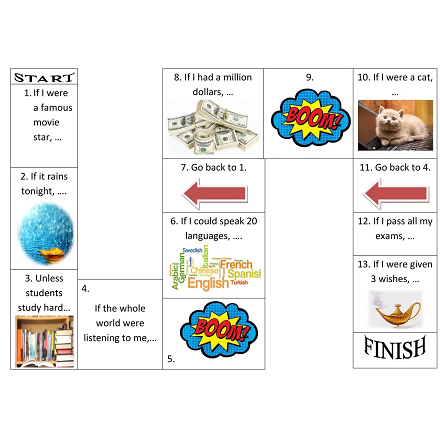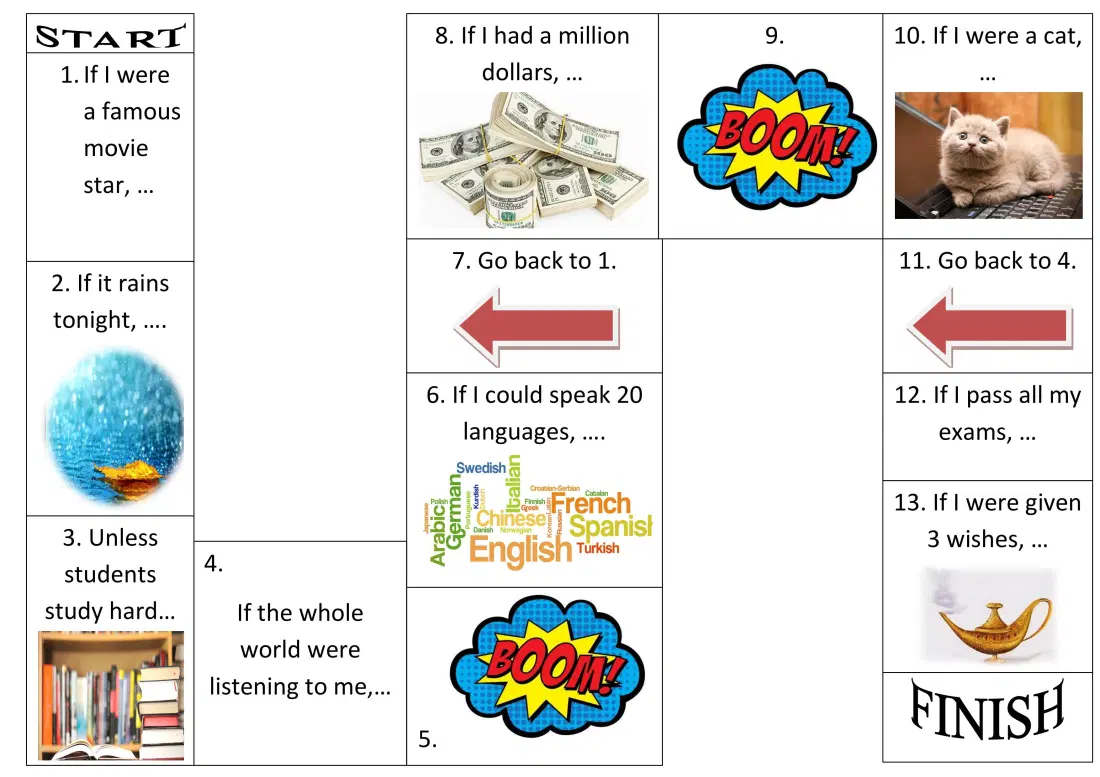Stamatia Savvani
"It should be noted that children at play are not playing about; their games should be seen as their most serious-minded activity." Michel de Montaigne
Games
Click on the links below to find game templates, useful sites and ideas on how to play well known games in order to practice language skills. The suggested level for each activity is specified but the activities can easily be adjusted to suit your students' needs.
-

Tic-Tac-Toe: Comparative
View more -

Memory: Irregular Verbs
View more -

Board Game: Conditionals
View more -

Taboo: Vocabulary Practice
View more -

Simon Says: Adverbs
View more -

Create games ONLINE! (level: all)
View more -

Codenames & Spyfall (level: pre-intermediate and advanced)
View more -

Two favorite games for the ESL classroom (level: pre-intermediate and above)
View more
Tic-Tac-Toe: Conditionals
Stats
- Purpose: A fun way to revise the Comparative and Superlative form of adjectives
- Materials: copy of the board (PDF) that you can find here
- Time: 15 minutes approximately
- Level: beginner and elementary
Procedure
Divide your students in two teams. This activity will work better with a group of maximum 6 students, so that all students are given the chance to take a turn.
In order for students to claim a place on the grid, they should first make a sentence (using the comparative or superlative) regarding the animal featured on that spot. The students can be given a sample sentence if they have just learnt this grammar rule. For example: "An elephant is bigger than a zebra" or "The turtle is the slowest of all animals". Then they are expected to create their own grammatically correct sentence. With every correct sentence, the students are allowed to draw an X or O on the corresponding place on the grid. Just like in the tic tac toe game, the team that first has three Xs or Os in a row wins.
If students have difficulty finding the right adjective to describe the animal, a list of adjectives can be given to them beforehand. Also, make sure that students are aware of the vocabulary featured on the grid (in that case: animals).
More ideas
You may wish to use the same grid with a different vocabulary. I will be uploading and creating more grids upon request.
Feel free to share your ideas about what other grammar rules can be revised through this simple yet fun game.
Green solution
If you wish not to waste paper you can download the image file found at the top of this post and project it on a whiteboard, instead of printing the pdf file. Students can use markers to claim their tile.
Have fun playing!
Memory Game for Irregular Verbs
Yes, we've seen the classic memory game for teaching or revising (new) vocabulary. It can also be employed to introduce the irregular verbs in English.
You can print and cut out the cards below with the infinitive and past form of irregular verbs. Shuffle them, place them face down on a desk and let the game begin. Award points for the team or student that has the most correct pairs and play again!
It's a great way to introduce these words and let students make their connections to previously acquired material and relate the infinitive form with the past form of the verbs.
After students have been exposed to enough practice with the irregular verbs can also produce their own cards with which they can play later.
Here you can find cards with the most commonly used irregular verbs. There is also a page with blank cards you (or your students) can fill in!
Have fun learning!
Conditionals: a board game
Students can practice the first and second conditionals with the board game you can find below. Students can be divided into teams.

All you need is a dice, one token for each team and a copy of the board game. Each team rolls a dice and they have to move spaces equal to the number dictated by the dice. Unless the space dictates otherwise, students have to complete the sentence provided on that space using the correct conditional form. For example if they land on space number 2, they should give a sentence like "If it rains tonight, I'll stay indoors".
In case students land on a Boom space, they have to go back to Start! If they land on a space that directs them to move to another space, they have to go there and wait for their next turn. The first team to reach space 13 and correctly complete the sentence there, wins!
You can either print out the pdf file, which you can download here or project the image of the game on a whiteboard which you can find above (idea: use magnetic tokens to move around the board)!
Have fun!
Craft your own Taboo cards
Taboo is a great game for intermediate and advanced learners of English. Being able to describe a word without using the definition in your native language is a challenging process!
Playing Taboo can enhance both creative and cognitive skills of students and it takes no time to teach how to play, as almost everyone is familiar with this guessing game!
Here you can find some sample taboo cards I created with the help of my students! You can download the document, edit, print and play it!
(Note: most of the words included in these taboo cards are related to technology)
Enjoy!
Simon Says: Adverbs
Teaching adverbs? Time for action!
What better way to teach adverbs than demonstrate the adverb?
After you have explained the adverbs you wish to teach, give your students imperative sentences such as "Dance clumsily", "Sing terribly", "Walk tiredly". Then ask them to act out the sentences.
Not only will they be truly engaged but they will also understand the purpose of adverbs. Works miracles with kinesthetic learners; it's a great brain break for all ages!
Have fun!
Create games for language practice ONLINE!
I was thrilled when I found out about this website: wordwall.net. You can customize game or activity templates found on this platform to create your own exercises.
The colorful templates offered along with the game elements that are incorporated in the activities can help educators create their own quizzes in short time.
You can use these activities for introducing and practicing new grammar points or vocabulary. It is a user friendly platform, so even students can make their own digital games!
Below you can find two vocabulary activities I have created for intermediate students of English:
Codenames & Spyfall: two popular games ONLINE!
Wish to develop your deductive skills?
Are you sure you qualify for a spy?
Codenames and Spyfall are two popular party games that can prove to be great for your intermediate or advanced learners.
Through Codenames students can practice vocabulary and more specifically different interpretations and definitions of the same word.
In Spyfall players try to figure out who the spy is by asking yes or no questions. Thus, speaking skills are reinforced through this game.
The great news?
Both these games can be found online! Find the links and rules for the games below!
Enjoy!
Two favorite commercial tabletop games for the ESL classroom
Have your realized that your students rarely actually read the books you assign for homework? Do you feel that their writing skills should be developed but have run out of creative ways to engage them?
What if you had a way to both spark your students curiosity when it comes to books and engage them in playful, yet meaningful learning.
Below I list 2 (all-time-favorite) games that involve lots of language practice and interaction and aim both speaking, reading and or writing skills.
Bring your own book
In this game, all students are given (or can bring their own) fiction book in the classroom. There are cards with a phrase- prompt on them such as “text on a warning label” or “an item in a police report”. Students then skim-read the book and find a phrase or word in their book that corresponds to the prompt.
The game itself along with the rules and other useful material can be found on this website: Bring-your-own-book
Skills addressed: Reading, Speaking
Level: (pre)intermediate and advanced
Once upon a time
This storytelling game invites players to craft their own stories and create their characters using story cards as prompts and essential parts of the story.
Story cards are not available online. However, here you can find rules adjusted for the classroom: Once-upon-a-time
Skills addressed: Reading, Speaking, Writing
Level: (pre)intermediate and advanced